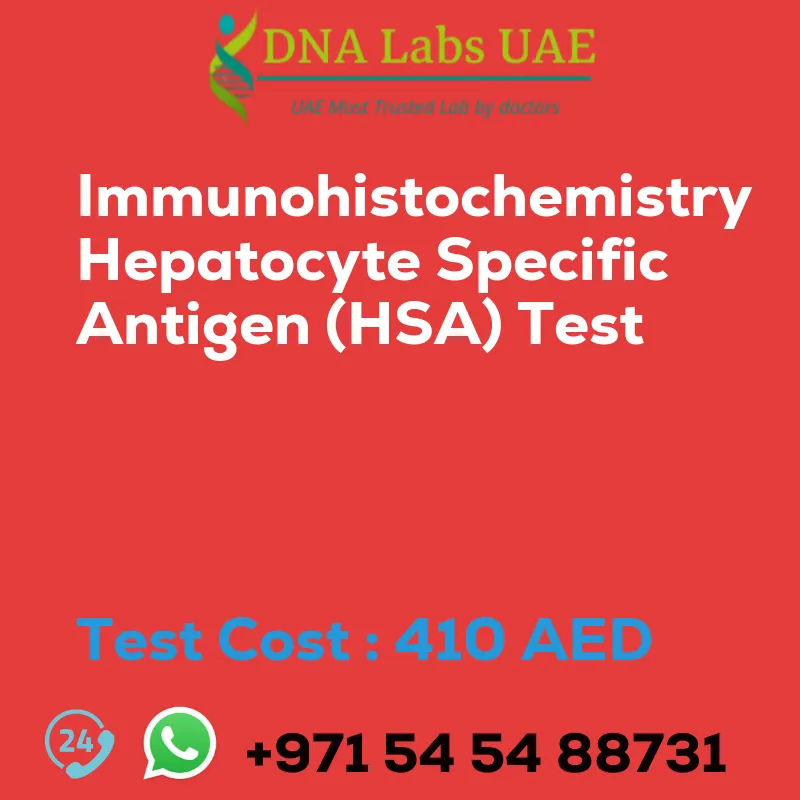IMMUNOHISTOCHEMISTRY HEPATOCYTE SPECIFIC ANTIGEN HSA Test
Test Cost: AED 410.0
Test Components: Immunohistochemistry
Sample Condition: Submit tumor tissue in 10% Formal-saline OR Formalin fixed paraffin embedded block. Ship at room temperature. Provide a copy of the Histopathology report, Site of biopsy, and Clinical history.
Report Delivery: Sample Daily by 6 pm; ReportBlock: 5 days Tissue Biopsy: 5 days Tissue large complex: 7 days
Test Type: Cancer
Doctor: Oncologist, Pathologist
Test Department: Pre Test Information
Pre Test Information: Provide a copy of the Histopathology report, Site of biopsy, and Clinical history.
Test Details
The immunohistochemistry hepatocyte specific antigen (HSA) test is a diagnostic tool used in pathology to detect the presence of hepatocytes, which are the main functional cells in the liver.
The test involves using specific antibodies that bind to the HSA protein, which is predominantly expressed in hepatocytes. These antibodies are labeled with a marker, such as a fluorescent dye or an enzyme, which allows for their detection under a microscope.
During the test, a tissue sample (usually a liver biopsy) is taken and processed into thin sections. These sections are then incubated with the HSA antibodies. If hepatocytes are present in the tissue sample, the antibodies will bind to the HSA protein, resulting in a positive staining pattern. This staining can be visualized under a microscope, allowing pathologists to identify and analyze the presence and distribution of hepatocytes.
The immunohistochemistry HSA test is commonly used to diagnose and characterize liver diseases, such as hepatocellular carcinoma (a type of liver cancer), hepatitis, and liver fibrosis. It can also be used to monitor the progression and treatment response of these conditions.
Overall, the immunohistochemistry HSA test provides valuable information about the presence and distribution of hepatocytes in liver tissue, aiding in the diagnosis and management of liver diseases.
| Test Name | IMMUNOHISTOCHEMISTRY HEPATOCYTE SPECIFIC ANTIGEN HSA Test |
|---|---|
| Components | |
| Price | 410.0 AED |
| Sample Condition | Submit tumor tissue in 10% Formal-saline OR Formalin fixed paraffin embedded block. Ship at room temperature. Provide a copy of the Histopathology report, Site of biopsy and Clinical history. |
| Report Delivery | Sample Daily by 6 pm; ReportBlock: 5 days Tissue Biopsy: 5 days Tissue large complex : 7 days |
| Method | Immunohistochemistry |
| Test type | Cancer |
| Doctor | Oncologist, Pathologist |
| Test Department: | |
| Pre Test Information | Provide a copy of the Histopathology report, Site of biopsy and Clinical history. |
| Test Details |
The immunohistochemistry hepatocyte specific antigen (HSA) test is a diagnostic tool used in pathology to detect the presence of hepatocytes, which are the main functional cells in the liver. The test involves using specific antibodies that bind to the HSA protein, which is predominantly expressed in hepatocytes. These antibodies are labeled with a marker, such as a fluorescent dye or an enzyme, which allows for their detection under a microscope. During the test, a tissue sample (usually a liver biopsy) is taken and processed into thin sections. These sections are then incubated with the HSA antibodies. If hepatocytes are present in the tissue sample, the antibodies will bind to the HSA protein, resulting in a positive staining pattern. This staining can be visualized under a microscope, allowing pathologists to identify and analyze the presence and distribution of hepatocytes. The immunohistochemistry HSA test is commonly used to diagnose and characterize liver diseases, such as hepatocellular carcinoma (a type of liver cancer), hepatitis, and liver fibrosis. It can also be used to monitor the progression and treatment response of these conditions. Overall, the immunohistochemistry HSA test provides valuable information about the presence and distribution of hepatocytes in liver tissue, aiding in the diagnosis and management of liver diseases. |







